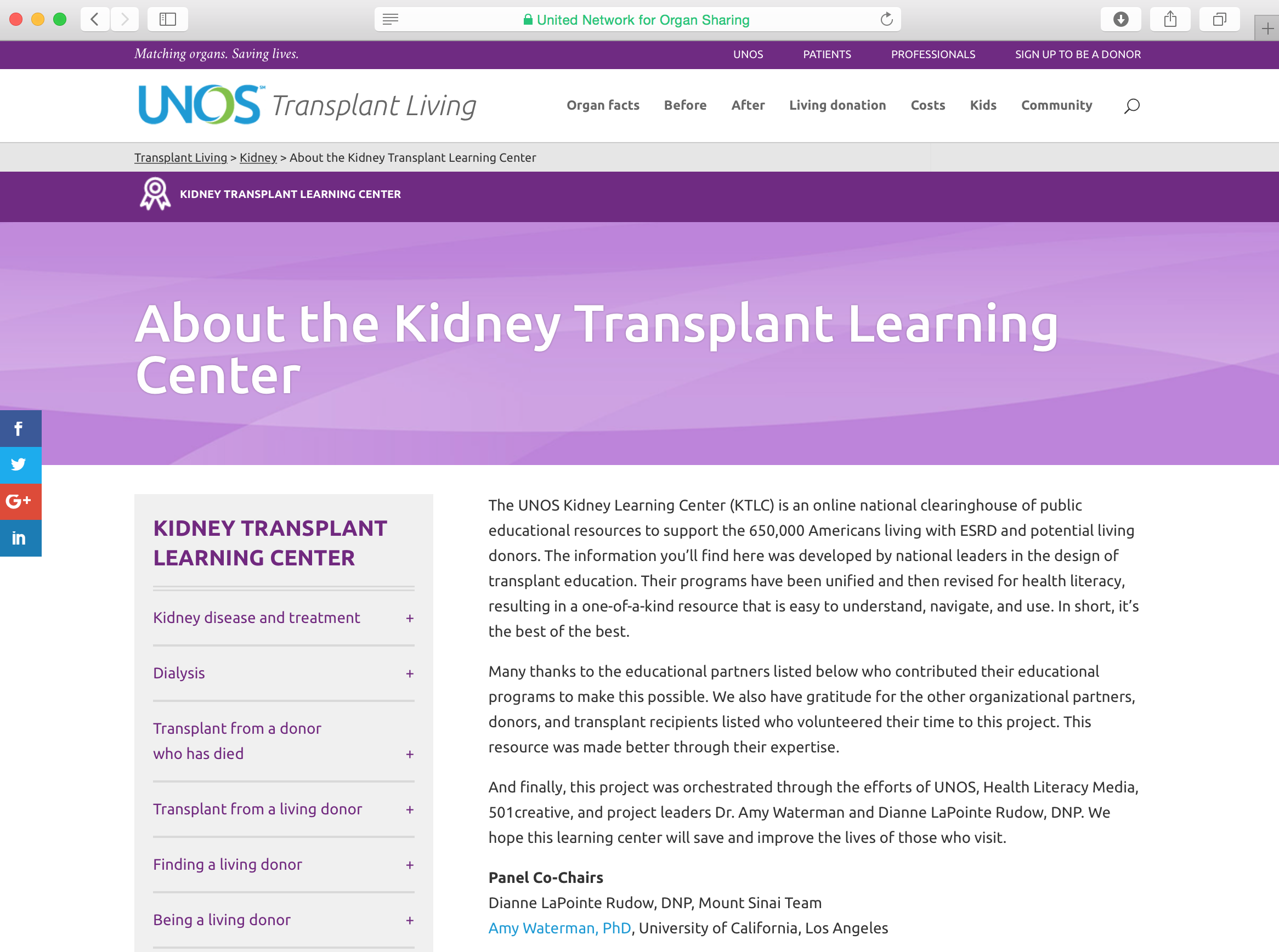Where should a kidney patient or potential living donor go online to get comprehensive information about transplant and living donation? How do they know that the information available online can be trusted to be accurate and unbiased?
In June 2016, nationally recognized transplant and kidney disease education experts were invited to take part in President Obama’s Organ Donation Summit to improve outcomes for individuals waiting for organ transplants and enhance support for living donors. One of the experts who spoke at the White House was Dr. Amy Waterman, Associate Professor in the Division of Nephrology at UCLA, and Deputy Director of the Transplant Research and Education Center (TREC) at the Terasaki Research Institute in Los Angeles.

As a result of the Summit, many national organizations in transplant partnered to create the UNOS Kidney Transplant Learning Center (KTLC), an online educational resource about transplantation and living donation. Many leaders in the development of transplant education contributed resources for use in the development of this tool. The KTLC is a new addition to the UNOS Transplant Living site (transplantliving.org), a comprehensive website for all transplant patients, which has just gone through a major overhaul. Along with adding the KTLC, a great deal of new content was added for each organ, the children’s section was expanded, and the site was completely redesigned to work better with mobile devices.
In creating the content for the KTLC, Dr. Waterman partnered with Health Literacy Media (HLM), specialists in developing concise and easy to understand content. Together they used health literacy best practices to gather and structure the educational content.
Catina O’Leary, Ph.D., President and CEO of HLM, said, “Making decisions about health is a challenge for everyone. For people living with complex health conditions, like ESRD, knowing what to do, when, where and how is an even bigger challenge. Together with partners from the most experienced and advanced transplant education groups in the U.S., and the people they serve, we’ve created a health literate, easy-to-access, public resource combining the best evidence education to help people make the best decision for their personal situation. We are so proud of this work and hope it goes a long way toward reducing the challenge to patients and families.”
The KTLC provides a guided learning experience that explains the basics of what kidneys are and what happens when they fail, and moves into a close comparison of pros and cons of each treatment, including the risks and benefits of dialysis, deceased and living donor transplant. It then goes into detail about how to find a living donor, and includes an explanation of the living donor experience, including risks and benefits.
The content was developed around the transtheoretical model of stages of change, which sees adopting healthy behaviors as a process, from not yet being ready to think about something, to learning about it, to acting on it and maintaining the behavior. Each section of the KTLC education builds on a person’s readiness to move into the next level of decision, moving people from simple information gathering to actions that will move them toward transplant or accepting a living donation.
Dr. Waterman shared her thoughts about the project, saying, “To speak at the White House representing a collaboration of leaders and organizations about the importance of online transplant and donation education was amazing. Knowing that this UNOS Kidney Transplant Learning Center exists is even more exciting. Our collaborative is committed that every kidney patient and potential living donor in the United States has the opportunity to learn and have state of the art information available to them online.”
Click here to access the UNOS Kidney Transplant Learning Center.
Click here to read more about Dr. Amy Waterman's experience at the White House Organ Summit.
The UNOS KTLC was developed in partnership with transplant education experts and programs from around the country, including:
• Beth Israel Deaconess Medical Center
• Duke University School of Medicine
• Emory University
• Mount Sinai Hospital
• John Hopkins University
• Northwestern University
• Temple University
• University of California, Los Angeles
Strategic partners on this project include:
• American Society of Transplantation
• American Society of Transplant Surgeons
• 501creative
• DaVita Kidney Care
• Donate Life America
• Health Literacy Media
• NATCO
• National Kidney Foundation
• ORGANIZE
• Rogosin Institute
• Sanofi Genzyme (corporate sponsor)
• Terasaki Research Institute
• United Network for Organ Sharing (UNOS)
• Veterans Administration

